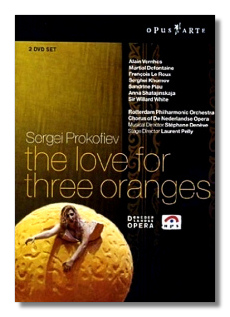
The Internet's Premier Classical Music Source
Related Links
- Prokofieff Reviews
- Latest Reviews
- More Reviews
-
By Composer
-
Collections
DVD & Blu-ray
Books
Concert Reviews
Articles/Interviews
Software
Audio
Search Amazon
Recommended Links
Site News
 DVD Review
DVD Review
Serge Prokofieff

The Love for Three Oranges
- Alain Vernhes – King of Clubs
- Martial Defontaine – the Prince (the King's son)
- Sandrine Piau – Ninette
- Anna Shafajinskaia – Fata Morgana
- François Le Roux – Leandro, the Prime Minister
- Serghei Khomov – Truffaldino, a court jester
- Natasha Petrinsky – Princess Clarice
- Marcel Boon – Pantaloon
- Willard White – Tchelio
Choir of De Nederlandse Opera
Rotterdam Philharmonic Orchestra/Stephane Deneve
Laurent Pelly – Stage Director, Costume Designer
Recorded Live in 2005 at the Het Muziektheater, Amsterdam
Opus Arte OA0957D 2DVDs 144min Dolby Digital DTS LPCM Stereo Anamorphic Widescreen
This is a truly magnificent production of Prokofieff's comic masterpiece, The Love for Three Oranges, an opera whose music, with its famous March, is better known from the popular suite that the composer derived from it. That's quite understandable: Prokofieff's operas often favor orchestral over vocal music, and that's the case here. The orchestration is brilliant in its vivid colors and sense of wit – listen to the imaginative brass writing, and note also how Prokofieff changes moods so quickly and so effectively. In fact, as operas go, this is as fast-moving as one could imagine, with a relatively large cast often scampering about the stage and getting involved in all sorts of silly plotting and slapstick action. The whole thing is simply a delight, not least because of Laurent Pelly's brilliant stage direction and costuming.
This is the French version of the opera, which is not the original, as claimed by several other critics in recent reviews on various websites. Prokofieff wrote the libretto in Russian, then made a French translation with the assistance of Vera Janacopoulos. It was in this French version that the opera was premièred in Chicago in 1921. There have also been English versions of the work, one of which was presented regularly by the New York City Opera for several decades in the latter 20th century.
As for the production here, the one outstanding singer in the cast is Sandrine Piau, an artist known primarily for her Handel and Mozart. But she has branched out into Britten and now to Prokofieff. Her portrayal of Ninette is charming, making you wish her role were larger. Martial Defontaine as the Prince, is also excellent. By the way, he wears pajamas throughout the production, to suggest, I would surmise, that the whole thing is a dream. That view would fit in with the otherwise fairytale-like character created here by Pelly, with costuming and scenery based on playing cards and with a farcical plot and witty, though not necessarily light Prokofieff score.
The rest of the cast is more than convincing, too, with Anna Shafajinskaia and Sir Willard White enchanting in their diabolical roles. The audience laughed many times during the performance and so did I. Even the conductor gets involved in the action and, surprisingly, divulges a deft sense for comedy. Musically, he is brilliant as well, and his orchestra and chorus respond with spirit and fine performances. The sound reproduction is superb and visual aspects excellent. This is one of the finest operatic productions in recent times and thus must merit the highest recommendations.
Copyright © 2006, Robert Cummings




















